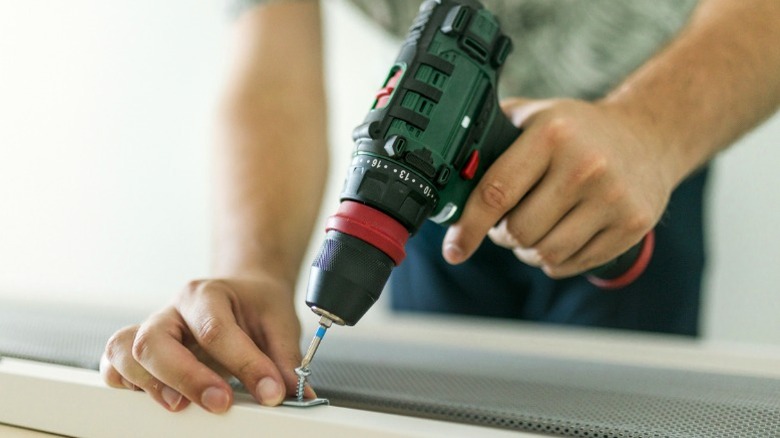Mistakes Everyone Makes When Buying Power Tools
Even though it's hardly the most earth-shattering choice you'll ever make, getting new power tools still leaves plenty of room for buyer's remorse if you don't do your due diligence before going into the store. With so many modern battery systems pushing you toward brand commitment, every purchase is critical. Comparing different versions of the product you're buying to ensure you're getting quality is essential, but you also have to think about what it could mean for your tool arsenal (and wallet) down the line. Make mistakes now, and you'll certainly regret it later in one way or another.
There are numerous aspects to consider when getting new power tools, from features and battery life to warranty coverage. For many, getting a deal is their motivating factor (and their first mistake). Sure, a crazy discount is a smart buy in a vacuum, but going on price alone will rarely yield the best value and may even cause more issues. For instance, you may forget to research the seller and run into return or warranty issues because they weren't an authorized dealer. Sometimes, there's a problem with the product not matching expectations. In fact, a 2023 Google/Ipsos poll revealed 42% of Americans say they've regretted a purchase they made when it was on sale. Comparing prices, finding deals, and springing for value-priced bundles should only come after you decide which power tools you need. The biggest mistakes you can make are not thinking about how you use your tools or doing the requisite research.
The key mistakes you might make when you buy power tools
Generally, sticking to the rule of buying the best quality within your budget is a simple way to avoid getting junk you'll later regret. Even so, quality for the price is only part of the equation. It's just as easy to spend more than needed, buying a power tool with more bells and whistles than your projects demand. One of the biggest regrets among most consumers is not really needing what they bought. While the exact reasons may vary, it often comes down to not doing enough research.
Think about why you need the power tool in question. What will you use it for? Don't make the mistake of buying a tool that's overpowered or underpowered for the situations where you'll need it. Where will you use it? Many make the mistake of overlooking corded options, preferring the intrigue of cordless convenience. When you only need the tool in one place, you'll get more bang for your buck by getting a corded version.
Consider how much you'll use your tools as well. Names like Milwaukee and DeWalt are some of the top-ranked tool brands, and are dependable and efficient in almost any situation. Still, the average DIYer may not need that kind of professional-grade equipment. If you'll only use the tools sparingly for odd, light-duty jobs at home, you can save money and get the same amount of satisfaction from budget-friendly options like the high-tech Ryobi tools that can help around the house and garden.
Easy mistakes to make when researching power tools
Considering your future needs is a central part of the buying process for individual cordless tools. With battery systems encouraging buyers to go with one brand to save the most money and gain the most convenience, you should look at those lines that have more of the tools you might need down the line. Each brand has its distinct pros, cons, and target customers. Understanding how each has found its niche will help you whittle down a list of tools aligning with your habits.
As they look for those platforms that fit their current and future needs the best, savvy consumers often make their choices among the most reliable power tool brands based on user reviews. Marketing hype is fine, but investigating real user experiences gives you the best look at what to expect in terms of power, durability, battery life, and features. Still, even these are easy to misinterpret if you only skim the surface.
Don't make the mistake of stopping at the star rating. Read the reviews, particularly the 3-star and below ratings. Look for common gripes indicating a genuine concern with the product that you'll likely experience. Consider how it would affect your uses. Sometimes, you'll find that low ratings are unwarranted for the item. They may focus more on bad seller experiences, revealing the product is actually fine but you should purchase it elsewhere. Or, the major complaint may be more due to user error than issues with the machine, unfairly lowering the rating.


